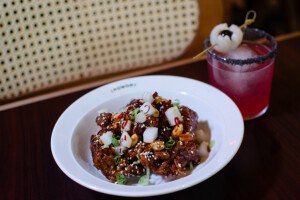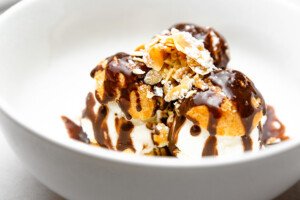Dining Out: Pig Tale
“I'd cooked Italian so much for Todd that I burned out on it,” Marc Orfaly told me on the phone after I'd dined several times at his new restaurant, Pigalle, named for the Paris district that connotes early-morning trips to Les Halles in the belly of the city for big bowls of beefy, cheesy onion soup. And of course it also connotes pork; now there are two Park Square/Theater District restaurants that have punningly put “pig” in the title, the other being Lydia Shire and Susan Regis' Pignoli.
Orfaly does like meat, especially the products of the friendly pig, and he's awfully good at the French way with them. Even if at his first restaurant Orfaly has turned away from the Italian theme of Olives—where he came to Boston prominence manning the stoves for Todd English—the rich and deep flavors he is producing, and the techniques he employs to achieve them, strike me as a true echo of English's training and personal tastes.
For several years I've been hearing from people whose palates I trust that Orfaly was a man to watch and follow. But following him has been a challenge. Orfaly has been a Stan Frankenthaler-like figure, making stops in various kitchens while getting the money together for his own place and making himself generally loved by diners and fellow cooks. For a while, I'd get mysterious messages on my voice mail: “Sage. Sunday night. Be there if you want to try his food.” (Orfaly had a regular gig at Sage with his friend Tony Susi.) But I never managed to catch a flying appearance, and Orfaly as main man remained an elusive promise.
We're lucky he decided to settle here. After running the kitchen of what might be Boston's best-known restaurant, Orfaly worked for a few of the nation's most respected cooks, including in Los Angeles Joachim Splichal at Patina and Mark Peel and Nancy Silverton at Campanile, and in New York Rocco DiSpirito at Union Pacific. These are chef's chefs.
One reason we're lucky is Orfaly's choice of partner both at and away from work: Kerri Foley, who is co-owner and general manager at Pigalle. Foley has been a prime mover in bringing gracious dining to Boston. It was she who, after spending three years at Gramercy Tavern in New York, gave the servers at No. 9 Park their casual polish. Managers from all over the country look to New York restaurateur Danny Meyer, owner of Gramercy Tavern and Union Square Café, to learn how to treat guests and keep a local and national clientele happy for years. Their field trips have brought this pair into close contact with the DNA of the country's best possible food and service.
Still, nobody said you have to start out perfect, and Pigalle began with a few strikes against it. The location, on Charles Street South, is convenient to theaters and Park Square and hard by Bay Village, the almost alarmingly gentrified neighborhood of overpriced townhouses. But it's slightly isolated, too, behind the Radisson Hotel and across from the Milner Hotel, in a dull '80s-era building. The room itself (the old Omonia) has an interesting vaulted ceiling supported by thick columns, but the ceilings are low for what would be a grand and beautiful design—at three times the height. The chocolate-brown scheme Foley and Orfaly chose may be cozy, especially in the unrelenting late winter when I visited, and the banquette seats are thick and very comfortable, but all that brown is dark and confining in a space that already risks feeling cramped.
Diners interested in seriously rich, seriously flavored food should celebrate being able to find Orfaly in the same place every night. But what makes me immediately recommend Pigalle to my gentility-starved friends—and nearly every restaurant manager in the city and surrounding area—is the perfection of the service. By perfection I mean nothing showy or obvious, no fixed smiles or simpers. I mean a real desire to please customers without promising anything the restaurant can't deliver. An unfailingly warm and dignified manner both on the phone and in the restaurant. Servers who are attractive because they're bright and enthusiastic, who are there when you need them and out of close range when you don't—quite a trick in a not-so-large, fairly crowded room. This might be because there's such a generous staff-to-customer ratio. But I think it has more to do with the careful training Foley doubtless provided before the restaurant's mid-December opening, and the tone she sets every night.
The dish of 2001 to date is Orfaly's braised-leek and peppered-goat cheese tart ($10), one of those can-this-be-that-rich dishes you keep eating bite after surprised bite. The surprise comes from the flavors you hadn't noticed before: the rich homemade chicken broth in which the leeks were braised to a sweet softness, the mild goat cheese warmed to make a crumbly, almost sauce-like topping, the slightly salty, miraculously crunchy crust, the incredible silken potatoes that give the whole thing its legs. Orfaly called them “Robuchon potatoes” when later telling me about the components. That's foodie lingo for waxy potatoes whipped with as much butter and cream as they can possibly absorb without oozing some of it back out. The masterly tart is one of those dishes people think they can get only in Paris, where limitless lashings of butter and cream are the norm.
Orfaly maximizes fat's best property—as a flavor carrier—also in a terrine of confit goose with foie gras and succulent Armagnac-soaked prunes ($18). It looks like spumoni, with its layer of silken foie gras in the middle and little cubes of shredded goose meat at each end. As with all confit, the meat has been simmered and packed in goose fat, but the short shards are moist, not bathed in fat. Orfaly told me that he learned his method of cooking fresh foie gras from a disciple of the legendary Alain Ducasse, who has recently had a succès de scandale by opening New York's most expensive restaurant. The confit, too, is very slowly warmed in its own fat and then left to cool to reabsorb it.
We've hit on Orfaly's theme: Cook it in fat, gently and carefully, and extract every bit of flavor. For these two dishes I can't imagine a better method to achieve such satisfying results. But I'm not sure this is the best way to treat “poached cod,” served with a hollandaise gratin, glazed salsify, and whole-grain mustard ($21). The poaching medium, it turns out, is oil—in this case, fennel oil. It's a way to keep delicate fish integral and moist, and give it flavor. I've had swordfish and tuna made as a confit and loved it. But cod doesn't really lend itself so well. And by its nature, something cooked and preserved in its own fat is meant to be eaten in stingy portions, to make it last, not in the huge brick of fish Orfaly served as a main course.
Pretty much every bite of everything on every guest's plate at two large dinners glistened with butter or oil. A special of skate ($24) had more of a matte finish, but that was because the skate had been dusted with instant-coating flour before being pan-fried, which somewhat absorbed the butter, hazelnut oil, and lemon juice Orfaly told me he used to finish the dish. The skate hardly had a chance to show my guest, who'd never tried the now-commonplace fish, just how good it can be, in its sinewy, cartilaginous way. We did like the butter-browned thin slices of baby artichoke and luxurious cèpes (porcini) strewn over the top.
This theme, in other words, has perhaps too many variations. Even the good steak frites ($19.50) had a pool of herbed butter on top—as honorably French a tradition as exists, of course, but after her terrine appetizer my devoted Francophile guest quietly scraped it off and dug into the pink-red meat. Orfaly does this very well, I should say. That herbed butter had plenty of neatly snipped fresh herbs. A plucked parsley salad, bright with lemon, garnished several plates, while each of three chicly small salads on a salade niçoise ($11) were very nicely herby from the citrus-and-fresh-herb vinaigrette they had soaked in. (One of the chef's tricks is to serve everything tepid, even those small salads, to allow the flavors to bloom.) But again, every forkful glistened. I longed for more touches like the quartered, boiled eggs and the nearly square slices of pepper-seared tuna with the niçoise (and, given the name, would in this case have preferred oil-packed canned tuna with haricots verts and plenty of lettuce). In his dogged pursuit of flavor it doesn't seem to occur to Orfaly to vary and relax the rhythm—a hallmark of Todd English and an approach that has certainly kept Olives popular. But all of us could have used a bit of simple, fresh letup.
That said, I must go into raptures over Orfaly's cassoulet ($19), the duck leg and lamb separately cooked and stored in—I need hardly add—their own fat. Orfaly described the several-day process to me, based on his reading of how they do it in Toulouse. He outlined the kind of luxury that chefs and a few home cooks have: namely, time to slowly cook everything so the flavors meld. The beans are plump, soft but not mushy, and beautiful to look at. Just as beautiful is the wide, thick slab of bacon that tops them. Europeans treat bacon cut like this as meat, slowly taking knife and fork to the moist, fat slice, savoring the jelly-like fat and the chewy lean. I did the same, but there wasn't much room left for the duck and the lamb, and there were plenty of each in the earthenware dish. This is a cassoulet that needs several days to both cook and eat.
Jan Novack, who has admirably honed her skill since her young-star days at Michela's (where Foley also worked), designed the wine list with attention to the chef's strengths and also to value. The mostly French list is moderately priced for the quality, and there are some appropriately fat-textured wines with enough acidity to stand up to the food. A Weinbach Gewürtztraminer was well-priced at $40 and carried us through both appetizers and main courses, and a $75 Meursault was a powerhouse splurge.
With all this richness you don't need dessert—and so far nothing warrants the overkill it would be after Orfaly's flavor blitzkrieg anyway. Dessert is Orfaly's next frontier, and he's planning a bread assault, too, he told me; so far he's buying bread from everyone's friend, Joanne Chang, whose Flour Bakery and Café in the South End has brightened all our lives.
We were the last to leave one busy Saturday night, and the remaining waiters lined up to see us out. They'd all been setting tables and repositioning chairs and otherwise straightening up, and we were completely unaware of any group formation as we were pulling on our coats at satisfied leisure. Yet there they were arrayed, seemingly genuinely pleased to have served us (and doubtless to be freed), saying they looked forward to seeing us again. Of course, they will. But given the richness of our meals, we might wait until it's time for winter coats again.


